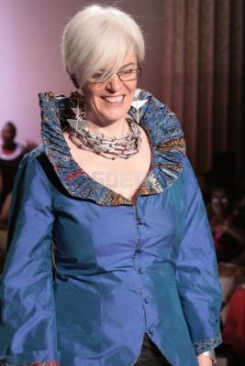
You have mentioned in the past that the 1998 terrorist bombing directly affected your business when some of your clients left the country. Tell us more about that...
In the early days, my clients were mainly NGO workers (Kenyan and expats). The bomb attack shook the confidence of many foreigners and many left the country. When things like that happen, people don’t shop much, as it seems frivolous. I had to completely downsize.
In 2003, you had to leave the country and take a break from your business, what triggered that?
The British Airways pulled out of Kenya for three months due to terrorism threats. A lot of companies and embassies sent most of their foreign employees home. I had to go out and get a job since at that time; most of my clients were expatriates. As a single parent, I had rent and fees to pay. I got a job in Zimbabwe in 2004 for one year and another in South Sudan in 2005. Business picked up again in 2006 until 2008 during the post-election violence.
Were you affected directly by the post-election violence?
Not really, but businesswise, the numbers went down. People rarely shop when there is tension, not unless you are in the security business, of course. People are not going to risk going out during such times.
How did you pick up from these setbacks?
Around 2006, more Kenyans embraced the brand and started shopping. In the late 1990s and early 2000s, Kenyans were more conservative. But things have since changed. People are now more aware about fashion and what they want to wear. Setbacks are what define entrepreneurship. I am very determined and resilient. If I’m passionate about something, I don’t give up easily.
What inspired The Festival for African Fashion and Arts (FAFA)?
The 2008 post-election violence. I asked myself what I can do for our country. I really wanted to bring people together and unite them by appreciating art and beauty. I also knew that the media would at least focus on more positive photos instead of the sad scenes.
You worked for an NGO before starting your fashion business. Why the drastic change of heart?
While in Europe, I was in the fashion industry before I landed a job with an NGO. I wanted a short break from the shallowness of the fashion scene, so I worked in Angola for a year as an administrator/logistician. I then went back to fashion and came to Kenya with the same NGO (Médecins Sans Frontières), for three months in between fashion jobs. I later decided to do it full-time.
Wasn’t it a huge risk quitting your job to start Kiko Romeo in a foreign country?
I had lived in Kenya for three years before starting Kiko Romeo, so I knew the country relatively well. I don’t mind taking risks, it makes life interesting.
Take us through the whole transition from your last days at the NGO to how you set up your business...
After doing the final external evaluation, I left and started making clothes with one fundi in my house. Soon, I hired two others and we worked for the better part of a year out of my garage on Denis Pritt Road.
How did your family and friends back home feel about your decision?
My family has always been supportive of my decisions, even though slightly worried about the viability of a fashion business.
Were you interested in fashion in the first place or was it just an unexplored opportunity you ventured into?
I was interested in fashion since I was a young girl. I enjoyed reading Vogue and making clothes for my dolls during the long evenings of Scottish winters. I started making my own clothes at the age seven, after learning the ropes from my mum.
What are some of the challenges that you faced setting up Kiko Romeo?
Initially I struggled to get the right quality product, so I had to invest a lot in training and mentoring staff and partner community groups. Part of the problem was their lack of exposure to the type of product I wanted to create.
Who was your first prominent client and how did they get to find out about you?
Gosh! I can’t remember exactly, though I vividly remember making things for Mrs. Mary Okello of Makini Schools and her daughter Clare, who represented Kenya internationally. We are still friends today.
 The Standard Group Plc is a multi-media organization with investments in media
platforms spanning newspaper print
operations, television, radio broadcasting, digital and online services. The
Standard Group is recognized as a
leading multi-media house in Kenya with a key influence in matters of national and
international interest.
The Standard Group Plc is a multi-media organization with investments in media
platforms spanning newspaper print
operations, television, radio broadcasting, digital and online services. The
Standard Group is recognized as a
leading multi-media house in Kenya with a key influence in matters of national and
international interest.









